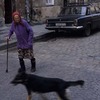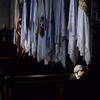Pope Salutes Ukrainian Catholics
Pope Benedict XVI has issued a statement commemorating the Soviet-staged "Synod of Lviv" in 1946, which inaugurated years of persecution for the Ukrainian Catholic Church.
In a letter to Cardinal Lubomyr Husar of Lviv, the Major Archbishop of the Ukrainian Catholic Church, the Pope wrote of "the sad events to which the cathedral of St. George at Leopoli was witness, in March of sixty years ago." At that pseudo-synod, a group of 216 priests met and-- under constant threats from Soviet troops-- announced that the Ukrainian Catholic Church was being merged into the Russian Orthodox Church.
On the authority of that pseudo-synod, Soviet troops confiscated the property of Ukrainian Catholic parishes, arrested the bishops, and began a systematic campaign to wipe out the Ukrainian Catholic Church. As Pope Benedict described the brutal campaign in his letter, "Violence against those who remained faithful to the Bishop of Rome intensified, giving rise to further suffering and forcing the Church to descend once again to the catacombs."
Sixty years later the Ukrainian Catholic Church-- which emerged from underground with new vigor after the fall of the Communist regime-- is marking the pseudo-synod of Lviv with a series of processions and liturgical events. The observances are intended, Cardinal Husar has observed, not to incite a desire for vengeance but simply to cement the sense of community among believers, especially in light of the immense sacrifices made by the past generation.
In his message to the Ukrainian prelate, Pope Benedict offers thanks to God that "the Greek-Catholic Church did not disappear but continued to bear her own witness to the unity, sanctity catholicity and apostolicity of the Church of Christ" during the decades of Soviet domination. In the face of persecution, he wrote, Ukrainian Catholics "managed to uphold Sacred Tradition in its integrity."
The Holy Father reminds the faithful of the Ukrainian Catholic Church that they have a dual obligation: to uphold the Eastern Christian tradition and to work cooperatively with their neighbors in the Latin-rite Catholic community.





